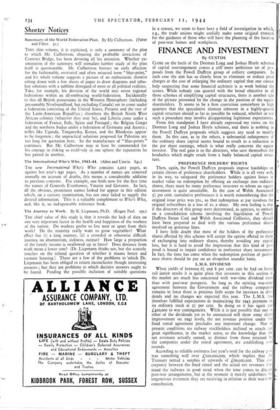FINANCE AND INVESTMENT
By CUSTOS
CLOSE on the heels of the Dorman Loog and Joshua Hoyle schemes of capital rearrangement comes a still more ambitious set of pro- posals from the Powell Duffryn group of colliery companies. In each case the aim has so clearly been to eliminate or reduce prior charges at the cost of enlarging the ordinary capital that one cannot help suspecting that some financial architect is at work behind the scenes. While nobody can quarrel with the broad objective in all these schemes of simplifying capital structures, there is another side of the picture presented by the change in the position of the equity shareholders. It seems to be a firm conviction somewhere in high quarters that the speculative element inherent in a highly-geared capital structure should as far as possible be reduced, whether or not such a procedure may involve disappointing legitimate expectations.
From this standpoint I have already expressed my views on the Dorman Long and Joshua Hoyle schemes, and there is nothing in the Powell Duffryn proposals which suggests any need to modify them. In this case, as in the others, a substantial enlargement of the ordinary share capital seems bound to result in a reduction in the per share earnings, which is what really concerns the equity investor. The real gain is to the directors, who save themselves the headaches which might result from a badly balanced capital struc- ture.
PREFERENCE HOLDERS' RIGHTS
Then, again, the Powell Duffryn proposals impose hardships on certain classes of preference shareholders. While it is all very well, in its way, to safeguard the preference holders against losses in market value on redemption by offering an exchange into ordinary shares, there must be many preference investors to whom an equity investment is quite unsuitable. In the case of Welsh Associated 5+ per cent, cumulative preferences it is worth remembering that the original issue price was 2IS., so that redemption at par involves the original subscribers in a loss of is. a share. My own feeling is that if the directors of this group were determined, as appears, to embark on a consolidation scheme involving the liquidation of Powell Duffryn Steam Coal and Welsh Associated Collieries, they should have been prepared to deal with the various preference shares involved on generous lines.
I have little doubt that most of the holders of the preference shares affected by this scheme will accept the option offered to them of exchanging into ordinary shares, thereby avoiding any capitil loss, but it is hard to avoid the impression that this kind of pro- posal is bound to impair confidence in preference share investment In fact, the time has come when the redemption position of prefer- ence shares should be put on an altogether sounder basis.
L.M.S. DIVIDEND When yields of between 61- and 8 per cent, can be had on home rail junior stocks it is quite plain that investors in this section of the market are much less concerned with war-time dividend rates than with post-war prospects. So long as the existing war-time' agreement between the Government and the railway companies remains in force there is precious little scope for increases in divi- dends and no changes are expected this year. The L.M.S. has therefore fulfilled expectations in maintaining the 1943 Payment on its ordinary stock at 2+ per cent. In doing so it has again put £400,000 to war contingencies. While it is just possible that one or other of the dividends yet to be announced will show some slight improvement on 1942 levels, the net revenue position under the fixed rental agreement precludes any important change. Nor in present conditions are railway stockholders inclined to attach any great significance, in the market sense, to the knowledge that the net revenues actually earned, as distinct from those retained by the companies under the rental agreement, are establishing new records.
According to reliable estimates last year's total for the railway pool was something well over Lioo,000,000, which implies that die Treasury netted .a surplus of upwards of £6o,000,000. this dis- crepancy between the fixed rental and the actual net revenues msY stand the railways in good stead when the time comes to discos post-war arrangements, but at the moment it merely underlines di: ungenerous treatment they are receiving in relation to their war-tune contribution.


























 Previous page
Previous page